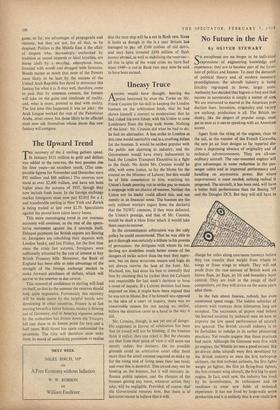Uneasy Truce
ANYONE would have' thought, hearing the praise bestowed by even the Tories on Mr. Frank Cousins for his skill in keeping the London busmen on the arbitration leash, that he had shown himself a convert to moderation; that he had risked his own future with his Union to save Londoners from the long walk home. Nothing of the kind : Mr. Cousins did what he had to do; he had no alternative. A bus strike in London at this time would inevitably end in a crushing defeat for the busmen. It would be neither popular with the public nor alarming to industry, and the Government would have every inducement to back the London Transport Executive in a fight to the finish. No doubt Mr. Cousins would be able, with some justice, to lay the blame for the contest on the Minister of Labour; but this would be of little consolation to him, watching his Union's funds pouring out in strike pay to sustain a stoppage with no chance of success. Neither the Union nor its leader could afford this, and not merely in its financial sense. The busmen are the only militant workers (apart from the dockers) that the TGWU contains; if they were defeated, the Union's prestige, and that of Mr. Cousins, would be dealt a blow from which it would take them years to recover.
In the circumstances arbitration was the only policy he could recommend. That he was able to get it through was certainly a tribute to his powers of persuasion: the delegates with whom he was dealing are doubtless much better aware of the dangers of strike action than the men they repre- sent; but on these occasions reason and logic do not always survive the heat of the hour. Mr. Macleod, too, had done his best to intensify that heat by claiming that he (rather than the Cabinet) was responsible for last week's decision to have a court of inquiry. If a Cabinet decision had been imposed on him, it might, have been argued that he was not to blame: But if he himself was opposed to the idea of a court of inquiry, there was no conceivable reason for not saying so, earlier, before the situation came to a head in the way it did.
Mr. Cousins, though, is not yet out of danger. His argument in favour of arbitration has been that its award will not be binding; if the busmen think it unfair, they can reject it. But the chances are that from their point of view it will seem not merely unfair, but derisory. On no possible grounds could an arbitration court offer them more than the small amount required to make up for the rising cost of living, since their last raise; and even this is doubtful. This award may not be binding on the busmen, but it will certainly in- fluence public opinion, and the chances of the busmen getting any more, whatever action they take, will be negligible. Provided, of course, that the Government remains firm. But there is at last some reason to believe that it will.


































 Previous page
Previous page